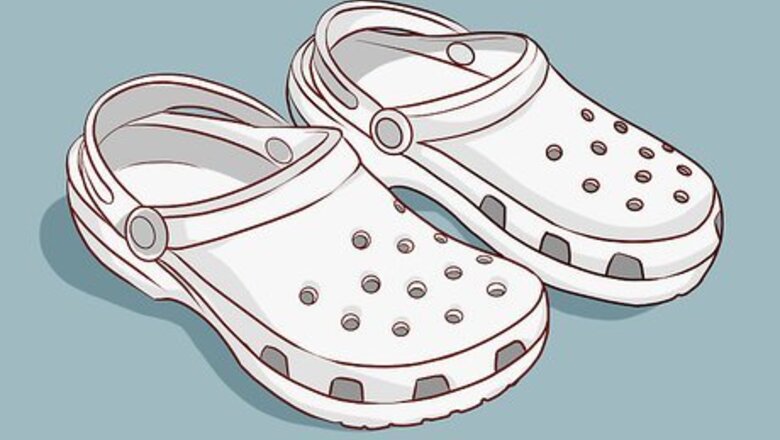
views
Prepping Your Crocs
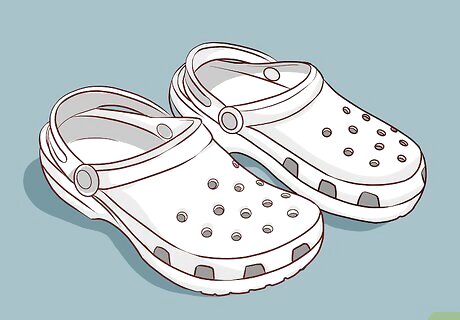
Use a pair of white Crocs for the best results. You can dye any pair of Crocs, but the colors are going to pop out more if they’re applied to a pair of white Crocs. In addition, this process may leave small areas unpainted and the white foam rubber will provide a more neutral background color for your design.Tip: It’s easier to hydro-dip a brand new pair of Crocs than it is to paint a worn down pair. Buy a new pair of Crocs if you really want a clean finish.
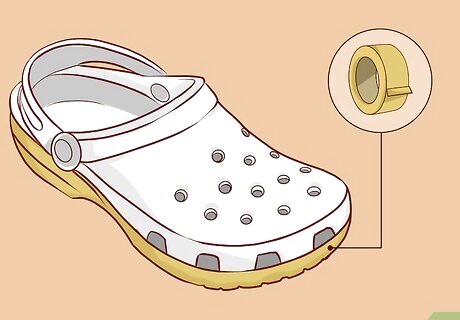
Tape off any areas you don’t want to paint with masking tape. You don’t have to dye every part of your shoe if you don’t want to. Many people leave the soles of the shoes unpainted or cover up the portion of rubber around the heel. Use strips of masking tape to cover any areas that you want to keep clean. If you want to protect the buttons on the strap where they attach to your shoe, put a piece of masking tape over them. Then, use a utility knife to cut around each button. Pull off the excess tape to leave the 2 smaller pieces behind.
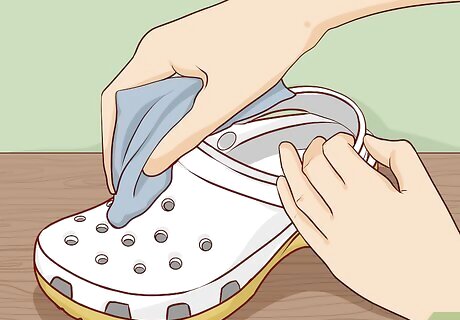
Clean the areas that you’re going to paint with a moist paper towel. Grab a baby wipe or run a paper towel under a stream of water for 1 second. Then, scrub every surface that isn’t covered in masking tape. Rub the foam rubber back-and-forth for 30-45 seconds to remove any surface dirt or dust. Let your shoes air dry or rub them dry with a clean towel.
Filling the Bin with Your Paints
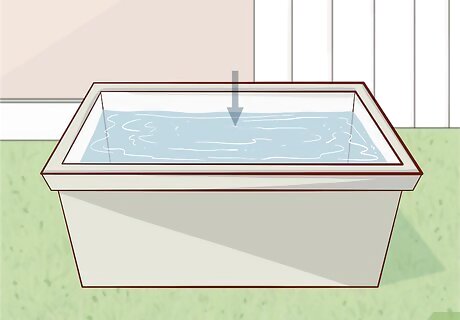
Go outside and fill a plastic bin with water. Get a plastic bin that is at least twice as big as your Crocs and deep enough to submerge them completely. You can’t realistically do this inside without getting paint and water all over the place, so take your bin out outside. Fill your plastic container 4/5 of the way with lukewarm water. You need a little room at the top of the bin. When you submerge your shoe, it will displace some of your water. If the bucket is too full, some of the water and paint will spill over. Plastic storage bins are usually perfect for this since they’re easy to clean when you’re done and can usually hold a lot of water.
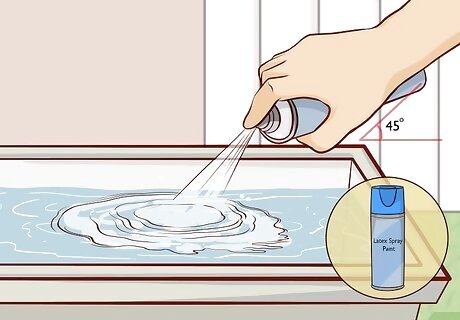
Apply spray paint to the surface of the water. You must use standard acrylic or latex spray paint to do this. Grab your first can of paint and shake it for 5-10 seconds until you hear the ball rattling inside. Then, hold the can at 45-degree angle and hold the nozzle 8–12 inches (20–30 cm) away from the water. Spray the middle of the water for 5-10 seconds to cover the upper layer of water in paint.Tip: The paint won’t come out evenly if you hold the can parallel to the floor and spray directly into the container. Keep the can tilted at an angle while you’re spraying to avoid sputtering and prevent uneven layers of paint. You don’t need a dust mask or respirator since you’re doing this outside, but you can wear one if the paint fumes tend to bother you. You can use a single color to dye your Crocs a different shade or use multiple cans of paint to create a unique pattern. If you want to dye your Crocs a solid color, spray your paint into the water for 30-40 seconds until the paint covers the entire surface of the water.
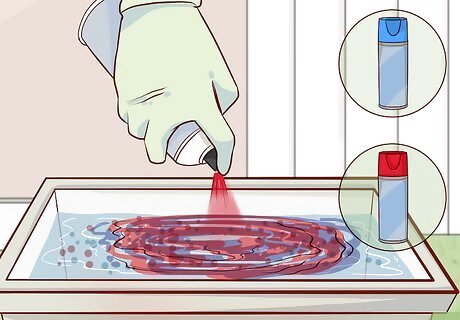
Spray additional colors in the middle of the water if you want multiple colors. You can stick with a single color, but adding multiple shades of paint to the water will create a cool pattern on your shoes. You can use anywhere from 2-3 additional colors for this. Spray each color in the middle of your previous color for 5-10 seconds. Allow the paint to spread around in the water after you spray each layer. The surface of the water should be completely covered with paint by the time you’re done adding your paints. If you use more than 4 colors, the paint may begin to mix together in the water. The paints will stay separated if you use 4 or fewer, though. For a tie-dye look, use blue, red, yellow, and green. You can spray these colors in a circular pattern away from the center of the water to mix them together like a classic tie-dye shirt! Any color combination can work for this since the paint won’t mix unless you use more than 4 colors. For a brighter combination, use a mixture of red, yellow, pink, and orange. For a cooler color combination, stick with darker colors like blue, purple, black, and green.
Hydro-Dipping Your Shoes
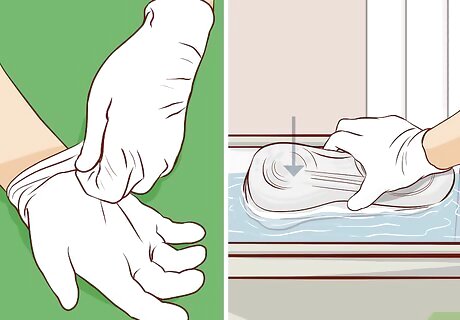
Put gloves on and carefully lower your first Croc into water. Throw on some thick rubber gloves to keep the paint off of your hands. Then, grab your first Croc and hold it upside down at a 45-degree angle. Hold it by the edges of the sole. If you added masking tape to the shoe, hold it over the taped-off section. Slowly lower your shoe without changing the angle that you’re holding it at. Continue to lower the shoe into the water until it is completely submerged. If you don’t want your fingers to block paint from getting on the shoe, tape a string to the sole of your shoe and lower it that way. The overall paint job may be a little inconsistent though if the shoe wobbles in the air as you lower it into the water.
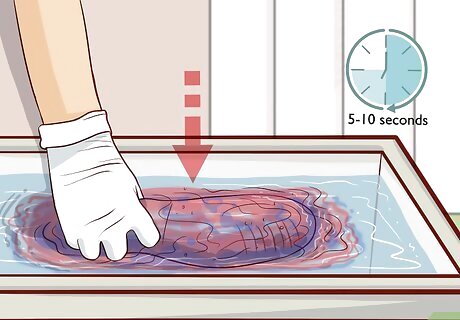
Brush the paint on top of the water away from the shoe and lift it out. Hold the shoe under the water for 5-10 seconds. The paint on the surface will catch on your shoe and there will be some open water surrounding your forearm. Use your free hand to keep this water clear as you slowly raise the shoe out of the water the same way you lowered it.Variation: If this doesn’t work, you can repeat the process again. Sometimes, the paint coagulates and won’t adhere to the shoe. If this happens, turn the shoe right-side up after you lower it and pull it out of the water. This will keep thicker layers of paint from sliding off.
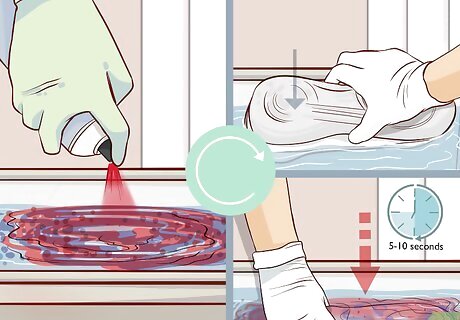
Repeat this process using the same colors with your second shoe. Set your dyed shoe aside. Grab your spray paint again and repeat the process by applying multiple colors to the water. You can use the same set of colors you used on the first shoe or mix it up a bit to create a truly unique pair. Dip this shoe into the water and pull it out the same way you covered the first shoe in paint. Clean your bin with water and dish soap if you want to reuse it in the future. If some of the spray paint won’t come off, use paint thinner to weaken it before scrubbing it off with a thick cloth.

Let your shoes air dry for 24 hours. The wet spray paint will take quite some time to dry. If it’s warm out and it isn’t supposed to rain, leave your shoes outside. If it might rain or it’s kind of cold out, set your shoes on top of a towel or plastic lid and take them inside. Wait at least 24 hours before touching your shoes.
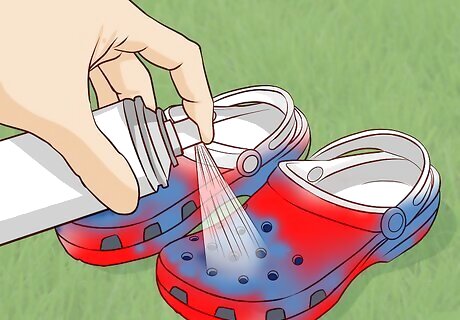
Spray your shoes with a clear acrylic fixative to protect the paint from fading. Get a can of clear-coat aerosol fixative designed for acrylic paint. Take your shoes back outside it you were drying them indoors. Shake the can of fixative until you hear the ball rattling inside. Then, hold the nozzle 8–12 inches (20–30 cm) away from the shoes and spray both of your Crocs in a thick layer of fixative. Wait 2-3 hours for the shoes to dry. The fixative will keep the paint from chipping and fading over time. Read the label on a can of fixative to see if it will protect acrylic paints. Most clear-coat fixatives will work with acrylic.




















Comments
0 comment